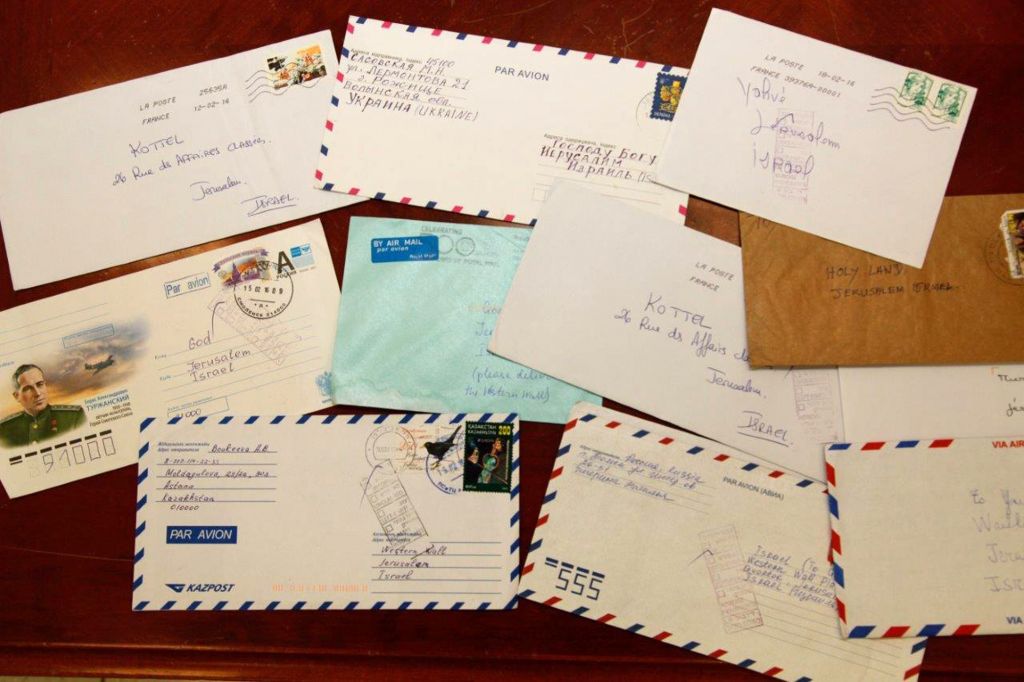
Letters addressed to God in Jerusalem. Israel’s postal service typically receives dozens of letters each year from around the world addressed to God, photo released by the Israel Government Press Office on September 21, 2016. (Government Press Office via AP)
Howard Epstein – LETTER FROM ISRAEL – “The Day of Our Fatal Divisiveness”: REFLECTIONS ON TISHA B’AV
On Tisha b’Av, that might justifiably be subtitled: “The Day of Our Fatal Divisiveness”, we in Israel are all too aware of the efforts of those who recently lost power in the Knesset to bring down the fledgling government of PM Naftali Bennett, irrespective of the damage they appear to be prepared to inflict on the nation’s interests. The risks of the Tisha B’Av narrative live on as I write, and doubtless as you read.
At the same time, the external threats merely slumber, the day of their re-awakening being unknown. In this lull in the continual fighting with Hamas and Hezbollah, we try to present Israel’s case to those willing to listen. Israel’s Ambassador to the UN and the USA, Gilad Erdan, explained our case to a group of foreign diplomats on a visit to Jerusalem’s Old City last Friday, coming from as far afield as Australia, Argentina, Bhutan, Czech Republic, Dominican Republic, Hungary, Kenya, Guatemala, Ukraine and Tonga.
For some, it may have been a matter of preaching to the converted, but reinforcement is better than neglect, and it may work more generally “pour encourager les autres”. In any event, the message was that Israel will continue to defend itself, and its rights to Jerusalem, against the lies of the terror group, Hamas, whose charter proclaims its desire to destroy Israel.
Newly installed and highly regarded President of the State of Israel, Isaac Herzog, spoke of the internal and eternal problems of which we are reminded by Tisha b’Av. Addressing a crowd in Ashkelon he said: “We must learn that, God forbid, history can repeat itself, if we do not know how to maintain our unity. We can argue, we can maintain our difference, that’s part of the beauty of Israeli society [but] we must overcome the fear, and reach out to each other, and install love of Israel in all of our hearts.”
In the light of this, it is instructive to see what is going on, on the ground, at the Western Wall of our ancient and lost Temple, the fulcrum of Judaism and Zionism. Both are restless forces.
It seems that, almost undetected until now, Jewish prayers have been held in recent months on Temple Mount. This appears to herald a major change to the status quo since the end of the Six Day War in June 1967, when the Old City of Jerusalem was recaptured by the IDF. (It was ejected by Jordan in the War of Independence.)
A Channel 12 TV report by religious affairs reporter, Yair Cherki, seemed to show Israeli policemen, who have previously responded negatively and trenchantly to the suspicion of a Jewish prayer recital, being quite unresponsive to prayers intoned in Hebrew at the holy site in the past few days.
Cherki reported: “For months now, every morning this unofficial prayer quorum has been praying on the Temple Mount.” Apparently, without prayer books, tefillin or any other symbols of prayer that could draw unwanted attention from Muslims close to the Al-Aqsa Mosque, a new precedent is being set. No one knows how long it will be before it provokes a reaction from Jordan or Gaza, but it will be heart-warming for some Israelis to think that their interests are being asserted. That could not be internally divisive, could it?
Perhaps the answer is no; yet, not more than a few metres away from, and below, those putative worshippers and policemen, as we learn contemporaneously, a noisy megillah reading was being held by a group of “hard-line religious-Zionist activists” in the section of the Western Wall known as “egalitarian”, to the discomfort of the Conservative worshippers, trying to hold their own service there. A spokesman for the Masorti Movement said that their reading of Eichah (the Book of Lamentations) was drowned out. This is a space to be watched.
Should a shortage arise of bad news stories centred on divisions in Israeli life, one can always turn to the cinema, for there is no dearth of cinematographic awards earned on the subject of Israel’s travails.
Ajami (2009), was set in the Christian/Muslim neighbourhood of Jaffa and brought into focus the dynamics of a poor, real-life community. It earned a nomination for the Academy Award for Best Foreign Language Film.
5 Broken Cameras (2012), directed by Palestinian Emad Burnat and Israeli Guy Davidi, was a highly controversial, but critically-acclaimed, first-hand account, from the perspective of five cameras, documenting protests and IDF responses over the construction of the West Bank barrier (which has reduced terrorist outrages to around a hundred attempts a year). It was nominated for Best Documentary Feature at the 85th Academy Awards
The Gatekeepers (2012), too, was nominated for an Academy Award for Best Documentary, for its powerful interviews with Shin Bet, Israel’s internal security service. The strength of Israeli democracy was plain, but some said it tended to show that Israel was not dissimilar from Nazi Germany, given the emphasis upon Palestinian suffering.
Clearly, they had not read enough about Nazism. No terrorism inflicted by Jews on Germans had been detected when Hitler got going, but, where there is a movie award to be won, how important can that be?
I may return to the phenomenon of Israel-bashing in the name of art in the near future. Until then, at least, may your community enjoy peace and cohesion.
© July 2021 Howard Epstein








